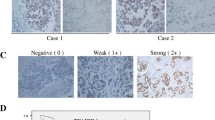Abstract
The Forkhead box P3 (FOXP3) transcription factor is the key driver of the differentiation and immunosuppressive function of regulatory T cells (Tregs). Additionally, FOXP3 has been reported to be expressed in many solid tumor cell lines and tissues. However, its role in tumorigenesis and tumor progression is conflicting, both tumor suppressive and promoting functions have been described. In this study, we demonstrated that FOXP3 was expressed in both lung adenocarcinoma tissues and the lung adenocarcinoma cell line A549. FOXP3 inhibition decreased cell proliferation, migration, and invasion as well as the secretion of inhibitory cytokines (e.g., transforming growth factor beta 1 (TGF-β1), interleukin 35 (IL-35), and heme oxygenase-1 (HMOX1)), suggesting a positive role for FOXP3 in tumor development. Importantly, we found that FOXP3 could enhance lung adenocarcinoma cell proliferation via upregulating the levels of the cell cycle G1/S checkpoint gene CCND1. These data demonstrated that FOXP3 could be regarded as a novel therapeutic target for inhibiting lung adenocarcinoma progression.






Similar content being viewed by others
References
Brunkow ME, Jeffery EW, Hjerrild KA, et al. Disruption of a new forkhead/winged-helix protein, scurfin, results in the fatal lymphoproliferative disorder of the scurfy mouse. Nat Genet. 2001;27:68–73.
Bennett CL, Christie J, Ramsdell F, et al. The immune dysregulation, polyendocrinopathy, enteropathy, X-linked syndrome (IPEX) is caused by mutations of FOXP3. Nat Genet. 2001;27:20–1.
Schneider T, Kimpfler S, Warth A, et al. FOXP3+ regulatory T cells and naturalkiller cells distinctly infiltrate primary tumors and draininglymph nodes in pulmonary adenocarcinoma. J Thorac Oncol. 2011;6:432–8.
Shimizu K, Nakata M, Hirami Y, et al. Tumor-infiltrating FOXP3+ regulatory T cells are correlated with cyclooxygenase-2 expression and are associated with recurrence in resected non-small cell lung cancer. J Thora Oncol. 2010;5:585–90.
Karanikas V, Speletas M, Zamanakou M, Kalala F, Loules G, Kerenidi T, et al. Foxp3 expression in human cancer cells. J Transl Med. 2008;6:19.
Hinz S, Pagerols-Raluy L, Oberg HH, et al. Foxp3 expression in pancreatic carcinoma cells as a noveral mechanism of immune evasion in cancer. Cancer Res. 2007;67:8344–50.
Triulzi T. FOXP3 expression in tumor cells and implications for cancer progression.Taqliabue E, Balsari A, et al. J Cell Physiol. 2013;1:30–5.
Redpath M, Xu B, van Kempen LC, et al. The dual role of the X-liked FoxP3 gene in human cancers. Mol Oncol. 2011;2:156–63.
Jia T, Fu HY, Sun JT, et al. Foxp3 expression in A549 cells is regulated by TLR4 through NF-κB. Mol Med Rep. 2012;6:167–72.
Milkova L, Voelcker V, Forstreuter I, et al. The NF-kappaB signaling pathway is involved un the LPS/IL-2-induced upregulation of Foxp3 expression in human CD4+CD25high regulatory T cells. Exp Med. 2003;4:403–11.
Li B, Samanta A, Song X, et al. FOXP3 ensembles in T-cell regulation. Immunol Rev. 2006;212:99–113.
Martin F, Ladoire S, Mignot G, et al. Human FOXP3 and cancer. Oncogene. 2010;29:4121–9.
Liu R, Kain M, Wang L. Inactivation of X-linked tumor suppressor genes in human cancer. Future Oncol. 2012;8:463–81.
Niu J, Jiang C, Li C, et al. Foxp3 expression in melanoma cells as a possible mechanism of resistance to immune destruction. Cancer Immunol Immunother. 2011;8:1109–18.
Ma C, Peng C, Lu X, et al. Downregulation of FOXP3 inhibits invasion and immune escape in cholangiocarcinoma. Biochem Biophys Res Commun. 2015;2:234–9.
Chen YH, Zhang HH, He GX, et al. Expression of FOXP3 in hepatoma cells can directly promote tumor metastasis in vitro and in vivo. Hepatology. 2012;794A.
Wang G, Liu G, Li X, et al. FOXP3 expression in esophageal cancer cells is caaosiated with poor prognosis in esophageal cancer. Hepatogastroenterology. 2012;119:2186–91.
Zuo T, Liu R, Zhang H, et al. FOXP3 is a novel transcriptional repressor for the breast cancer oncogene SKP2. J Clinl Invest. 2007;117:3765–73.
Zuo T, Wang L, Morrison C, et al. FOXP3 is an X-linked breast cancer suppressor gene and an important repressor of the HER-2/ErbB2 oncogene. Cell. 2007;129:1275–86.
Ladoire S, Arnould L, Mignot G, et al. Presence of Foxp3 expression in tumor cells predicts better survival in HER2-overexpressing breast cancer patients treated with neoadjuvant chemotherapy. Breast Cancer Res Treat. 2011;125:65–72.
Douqlass S, Meeson AP, Overbeck-Zubrzycka D, et al. Breast cancer metastasis: demonsrtation that FOXP3 regulates CXCR4 expression and the response to CXCL12. J Pathol. 2014;1:74–85.
Wang L, Liu R, Li W, et al. Somatic single hits inactivate the X-linked tumor suppressor FOXP3 in the prostate. Cancer Cell. 2009;16:336–46.
Li W, Wang L, Katoh H, et al. Identification of a tumor suppressor relay between the FOXP3 and the Hippo pathways in breast and prostate cancers. Cancer Res. 2011;71:2162–71.
Zhang HY, Sun H. Up-regulation of Foxp3 inhibits cell proliferation, migration and invasion in epithelial ovarian cancer. Cancer Lett. 2010;287:91–7.
Lopes JE, Torqerson TR, Schubert LA, et al. Analysis of FOXP3 reveals multiple domains required for its functions as a transcriptional repressor. J Immunol. 2006;5:3133–42.
Chen C, Rowell EA, Thomas RM, et al. Transcriptional regulation by Foxp3 is associated with direct promoter occupancy and modulation of histone acetylation. J Biol Chem. 2006;281:36828–34.
Du JG, Huang CJ, Zhou BH, et al. Isoform specific inhibition of ror mediated transcriptional activation human foxp3. J Immunol. 2008;180:4785–92.
Harada K, Shimoda S, Kimura Y, et al. Significance of immunoglobulin G4 (IgG4)-positive cells in extrahepatic cholangiocarcinoma: molecular mechanism of IgG4 reaction in cancer tissue. Hepatology. 2012;1:157–64.
Ebert LM, Tan BS, Browning J, et al. The regulatory T cell-associated transcription factor FoxP3 is expressed by tumor cells. Cancer Res. 2008;8:3001–9.
Sathe A, Koshy N, Schmid SC, et al. CDK4/6-inhibition controls proliferation of bladder cancer and transcription of RB1. J Urol. 2015;15:04685–6.
Rihani A, Vandesompele J, Speleman F, et al. Inhibition of CDK4/6 as a novel therapeutic option for neuroblastoma. Cancer Cell Int. 2015;15:76.
Author information
Authors and Affiliations
Corresponding author
Rights and permissions
About this article
Cite this article
Li, Y., Li, D., Yang, W. et al. Overexpression of the transcription factor FOXP3 in lung adenocarcinoma sustains malignant character by promoting G1/S transition gene CCND1. Tumor Biol. 37, 7395–7404 (2016). https://doi.org/10.1007/s13277-015-4616-3
Received:
Accepted:
Published:
Issue Date:
DOI: https://doi.org/10.1007/s13277-015-4616-3




